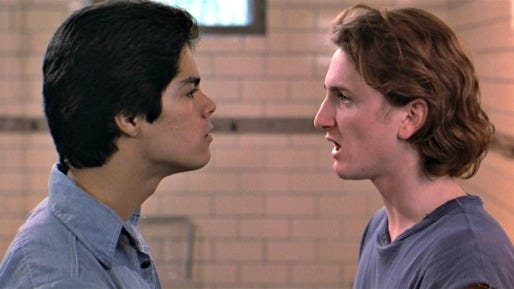Bad Boys (1983)

The title "Bad Boys" has come to be associated with the awful Will Smith/Martin Lawrence buddy-cop franchise, but it has always made me think of this gritty 1983 prison drama starring Sean Penn, which stuck with me from my youth.
It was Penn's first lead role, and after the tremendous success of "Fast Times at Ridgemont High" the previous year, he could easily have been typecast in Spicoli-type jobs for the rest of his life. Yet Penn took a hard left turn by portraying Mick O'Brien, a truly depraved teen who, in the opening minutes of the film, busts in a car window to steal an old lady's purse and then smashes in the face of the good Samaritan who pursues him.
In making this young, remorseless thug identifiable and even relatable, Penn showed the first glimmerings of his potential as a serious dramatic performer. Of course, he blossomed into one of the best actors of his generation, a two-time Oscar winner before the age of 50, and seemingly destined for many more important roles and accolades.
His performance is even more impressive in that the screenplay certainly doesn't give him a whole lot with which to work. As written by Richard Di Lello, Mick is gutsy but not particularly intelligent and is given little impactful dialogue to say. Penn's turn is based more on his screen presence than anything his character says or does.
The plot is pretty straightforward. Longtime petty criminal Mick finally gets nabbed during a drug deal gone bad. He's attempting to rob Paco Moreno (Esai Morales), a rival from high school, when he and his crew are intercepted by a third gang. In the ensuing chaos, Mick's best friend, Carl (Alan Ruck, forever Cameron from "Ferris Bueller's Day Off"), is slain and Mick runs over Paco's kid brother while fleeing police.
He gets sent to juvenile prison, which is the usual jungle of barely controlled outlaw behavior, with various cliques and power centers. Before long, Mick has climbed to the top of the hierarchical heap. At this point, Paco is sent to the same prison for raping and beating Mick's girlfriend. The last 45 minutes or so is one big (over)long buildup to their inevitable showdown.
There are a couple of truly gasp-worthy disconnects from logic in the screenplay. The first and most obvious is that the warden has to house Paco in the same cell block as Mick, knowing full well their violent history, because "all the other centers in the state are full." This is patently absurd. The idea that nowhere in the state of Illinois is a single bed available for a juvenile offender is just ridiculous.
In fact, we are told several times that Mick and Paco are housed in C-block. So, what, there was no room in A- or B-block? If you were certain two inmates would come to murderous blows, one would take every precaution to split them up — even if that means one of them gets stuck in solitary isolation for a couple of weeks.
The other big plot hole is the nature in which Mick ascends to being the "barn boss" of C-block. When he arrives, Mick becomes the target of the two head inmates, "Viking" Lofgren (Clancy Brown) and "Tweety" Jerome (Robert Lee Rush). But he takes them both out in a tremendous brawl where he's armed himself with several cans of soda wrapped in a pillow case. After getting some time in isolation, Mick is named "barn boss," receiving all the commensurate perks: assignment of prisoner work details and a cut of the illicit cigarette trade.
Now think about that. Why would the prison supervisors allow positions of power to be determined by combat? That seems like a laughably lousy way to maintain order. That approach is less rehabilitative than Darwinian.
These quibbles aside, I found the overall level of acting in the film to be as good as I'd remembered. Director Rick Rosenthal, who's spent most of his career in television, gets some very naturalistic, unornamented performances out of his young cast (most of whom, I should note, were in their early- to mid-20s playing teenagers). I should also mention Eric Gurry as Horowitz, a brainy but disturbed kid who becomes Mick's right-hand man. Gurry had a short but notable run of child acting roles in the 1980s.
What's most notable about "Bad Boys" is the level of authenticity the cast and director bring to the proceedings. These are not cutesy kids doing naughty things. Most of the inmates in C-block are serious offenders who have murdered, maimed and raped. Even the nerdy Horowitz killed three people firebombing a bowling alley. He was targeting some bullies who beat him up and his only regret is that he killed the wrong three people.
This was the only produced screenplay by writer Di Lello, though he did have a story credit on "Colors," another Penn film. Despite the criticisms mentioned earlier and a certain predictability to the last third of the story, it's still a bold original work that takes the trouble to look at some disturbed teenagers with more than simplistic strokes.
Penn and Morales take on a noticeable change as they transition from the streets of Chicago to the inside of the prison. Penn takes on a thousand-yard stare common among the long-term incarcerated. And both actors swell with prison-forged physiques they did not have before — the formerly skinny Morales' arms approaching Stallone-esque proportions.
I fondly regard "Bad Boys" among other films of the late 1970s and early '80s that formed deep impressions on me at a time I was first becoming seriously interested in movies. I've enjoyed these occasional visits down memory lane to catch up with these flicks and see how they stand up after so many years.
"Bad Boys" is seen in retrospect as a mostly forgotten but seminal movie that launched a lot of careers.
4 Yaps



